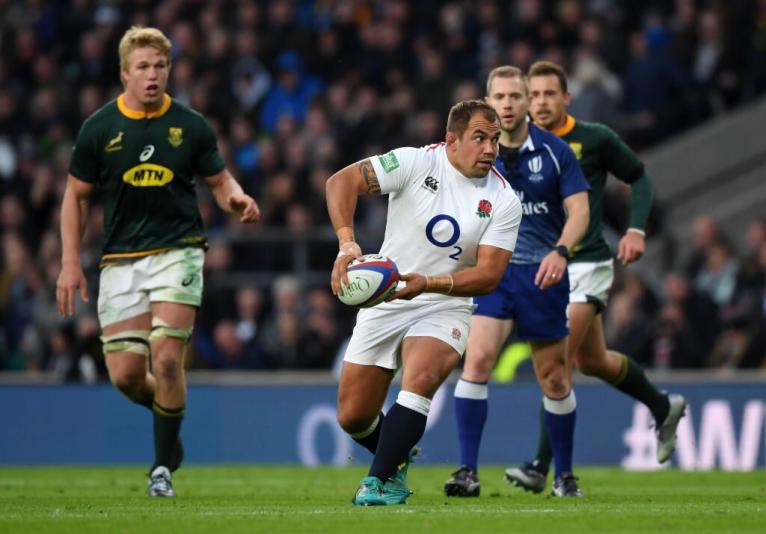Gritty England win highlights key work-ons ahead of All Blacks challenge

Gritty. Resilient. Tenacious. Opportunistic. Lucky.
There is a whole gamut of adjectives that describe tight, one-score contests that could be equally well attributed to England’s victory over South Africa on Saturday.
It was far from the most scintillating or easy on the eye of performances England have turned in over the last few years, but it was a win.
With England suffering through a number of injuries to key players and South Africa arguably less depleted, the absences of Faf de Klerk and Wille le Roux aside, not to mention the home side coming off the back of a 2-1 series defeat to the Springboks back in the summer, it was a game where result was always going to mean more than performance.
It’s also easy to forget given the success England have had prior to 2018 under Eddie Jones that South Africa are a team that England have consistently struggled against, even at Twickenham. When England beat South Africa in 2016, it ended a spell just four days shy of 10 years without a win over the southern hemisphere side.
It should also be acknowledged that England certainly rode their luck in the game.
From the three overthrown lineouts from Malcolm Marx in English territory to the fortunate call on Owen Farrell’s last-minute tackle on Andre Esterhuizen, there were a number of opportunities in the game whereby South Africa could have taken the contest out of England’s reach or snatched victory from the jaws of defeat.
England deserve credit for the resiliency of their defence at times, too, but it was as much Springbok profligacy as it was English steel that won the game for Jones and his charges.
Now, they prepare for the All Blacks, the undisputed number one side in the world and a side that England haven’t beaten since 2012.
If England go into that game with the same slow start and indiscipline that they showed against South Africa, the scoreline is all but certain to be far less flattering come the 80th minute.
Thankfully for Jones, there were some key lessons learned by England in victory on Saturday that can help them with the challenge that is about to come.
Continue reading below…
Watch: Eddie Jones discusses Owen Farrell’s tackle post-match and gives his take on England’s performance.
Pre-match concerns that Engand lacked carrying power among their forwards proved to be well-founded. Maro Itoje and Kyle Sinckler both grew into the game and had strong second halves, whilst Tom Curry and Mark Wilson did graft out some hard-earned metres as one-out runners, but it was generally an area that the home side struggled for success in.
The arrival of Zach Mercer from the bench definitely brought an energy to England, as he sought space between Springbok defenders, rather than running at jerseys. His eagerness to free his arms and look for offloads was also noticeable, even if no such situations presented themselves to him in such a tight game.
England won’t want to lose that positive impact from the bench, but they can’t afford to get themselves into a hole against New Zealand and his ability to get England moving forward makes him a prime candidate to move into the starting XV.
That move should not, however, come at the expense of Wilson, who enjoyed a coming out party at international level on Saturday.
The Newcastle Falcon was arguably England’s most impressive player and though he didn’t offer the carrying presence that either Billy Vunipola or Nathan Hughes regularly provide, his work rate was exceptional. Whether he was chasing kicks or dropping back into the 22 to field them, running support lines for carriers or making sure he was the first to the contact area, Wilson distinguished himself time after time at Twickenham.
It was a true measure of his ability at Test level and a far cry from the cameo performances he has had from the bench thus far in his international career. If Mercer is to come in at number eight, a spot should be found for Wilson on the flank, potentially at seven should the injury that sent Curry hobbling from the field prove to be significant.
Another player whose performance off the bench warrants a shot at the starting XV against the All Blacks is Ben Moon.

The loosehead stabilised the England scrum against the Springboks and it is a common misconception that the scrum is an area of weakness for New Zealand, as their set-piece is amongst the very best in the world.
If England want parity in that area, they need to look at starting Moon. There is a good reason why Exeter start Moon at club level and then bring on Alec Hepburn to torment tired teams.
Not only did Moon’s spot on the bench limit his effectiveness against South Africa, it also prevented Hepburn from being at his most effective. Switching the two would, based on Saturday’s performance and form at club level, be a win-win solution.
One somewhat of a problem position which arose at Twickenham was full-back.
It was not the commanding display from Elliot Daly that everyone wanted to see. On a number of South African kicks, Daly was coming on to the ball and should have commanded the space underneath and taken the dominant position to collect the ball. Instead, the chasing South Africans were able to get up early and in front of Daly, winning the contested ball, or at least batting it back into the arms of Springbok support.
The left-footed kicking option, as well as his range of 50m-plus from the tee both came in handy for England and are valuable weapons, so this is not a call to drop Daly. The full-back spot is a position which should be fiercely contested over the next week and even if Mike Brown does enough to win back the jersey, Daly should warrant a spot on the wing, such are the skills he brings.
Maybe the confidence of the win and another week of training will shake those wrinkles out of Daly’s game at 15, but given that he rarely plays the position for his club, it’s not surprising that it’s an area where the rust has settled in. With Beauden Barrett the arch-manipulator of space with his kicking game from hand, it’s an area where England are going to have be sharper next weekend.
Finally, a general work-on for England could well revolve around their tackling, which across the board was questionable against South Africa.
At times, it seemed as if England were trying to get into an arm wrestle with the Boks, in a show of physical bravado. The tackles were one-on-one and high, albeit legal, and English defenders were regularly being bounced off by the powerhouse South African carriers. The reluctance to go low, or frequently work in unison with another tackler, one going low and one going high, was an oddity in the performance.
If they continue to go high against New Zealand, perhaps in fear of the All Blacks’ potent offloading game, they are going to face the same struggles they did Saturday, with New Zealand’s carriers more than capable of breaking high, one-on-one tackles. Chemistry and cohesion are always hard to come by in the first game of an international window, so there is a good chance England will look improved in this area after another week of working with new defence coach John Mitchell, but it would be remiss of the hosts if it were not a facet of their game put under increased scrutiny this week in training.
Are the inclusions of Mercer and Moon, the retention of Wilson, an improved performance under contested balls and a smarter approach to tackling enough for England to trouble the All Blacks? It’s no small feat to ask, but they would bring positive change and help solidify the areas England struggled with against South Africa.
One thing working in England’s favour is that they certainly had a tougher preparation for the fixture than New Zealand, who sent out a largely developmental side against Japan on Saturday morning, so optimists can look at that gritty, resilient and lucky victory over the Boks and expect a battle-hardened England to take to the Twickenham field next week.
Watch: Steve Hansen speaks following New Zealand’s win over Japan.





































































